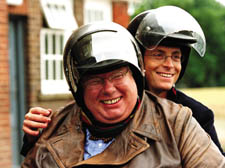|
|
 |

Richard Griffiths (left) as Hector and Stephen Campbell as Irwin |
Class adaption of Alan's schooldays
THE HISTORY BOYS
Directed by Nicholas Hytner
Certificate 15
THE History Boys has translated well from the stage on to screen. One of the reasons must be the decision to use the same cast who made Alan Bennett’s play such a success at the National Theatre.
The two conflicting arguments which have dogged the British education system are laid bare. On the one hand, you have the pupil’s dream teacher – Hector, the poetry-spouting intellectual giant, who teaches his charges the joys of language and is not afraid to have his pupils quote Thomas Hardy’s Drummer Hodge by heart, and then follow it up with a rendition of When I’m Cleaning Windows by George Formby.
He is fighting the corner of knowledge for it’s own sake, the sake of the beauty of learning.
On the other side we have the new recruit Irwin (Stephen Campbell Moore) employed by Cutler’s grammar school’s Oxbridge-obsessed and very vinegary headmaster, played by Clive Merrison.
He is there to help the boys cram, cram and then cram some more. He teaches them how to ‘cheat’ at their Oxford exams, how to let the tutors know you are capable of abstract thought. But it is obvious, after a while, the influence of Hector is greater.
That is the reason for this story, not an exploration of unrequited gay love in the classroom, which also helps the plot trundle along.
This group of teenagers are surprising well enlightened. Any one who has experience of the modern classroom would say homophobia among young men is often rampant. Instead, this class accepts and at times encourages, the expression of sexuality, no matter who it is directed at. A side plot to the story is Hector’s dismissal, after being caught fondling his pupils after offering them rides on his motorcycle. This helps spin out the story and add some tension.
Alan Bennett is at his finest here, and each character is given intricacies which make them an endearing bunch. But the downside is the occasionally simplistic nature of some of the stereotypes that are used, such as a sexy secretary seducing the boys, the small, gay Jew Posner or the less than intelligent Rudge who still manages to get the place at University he wants because of a strange twist in the old boy network, the spinster history teacher Miss Lintott, played by Frances De La Tour, and the student, looking remarkably like a young Alastair Campbell, who becomes a hard-nosed journalist later in life.
But perhaps the fact the characters in this north of England grammar school are so recognisable is a testimony to Bennett’s eye.
The History Boys is the usual Bennett-like take on the class system, the vagaries of Oxbridge, but above all, the beauty of the English language. |
| |
|
 |
|

